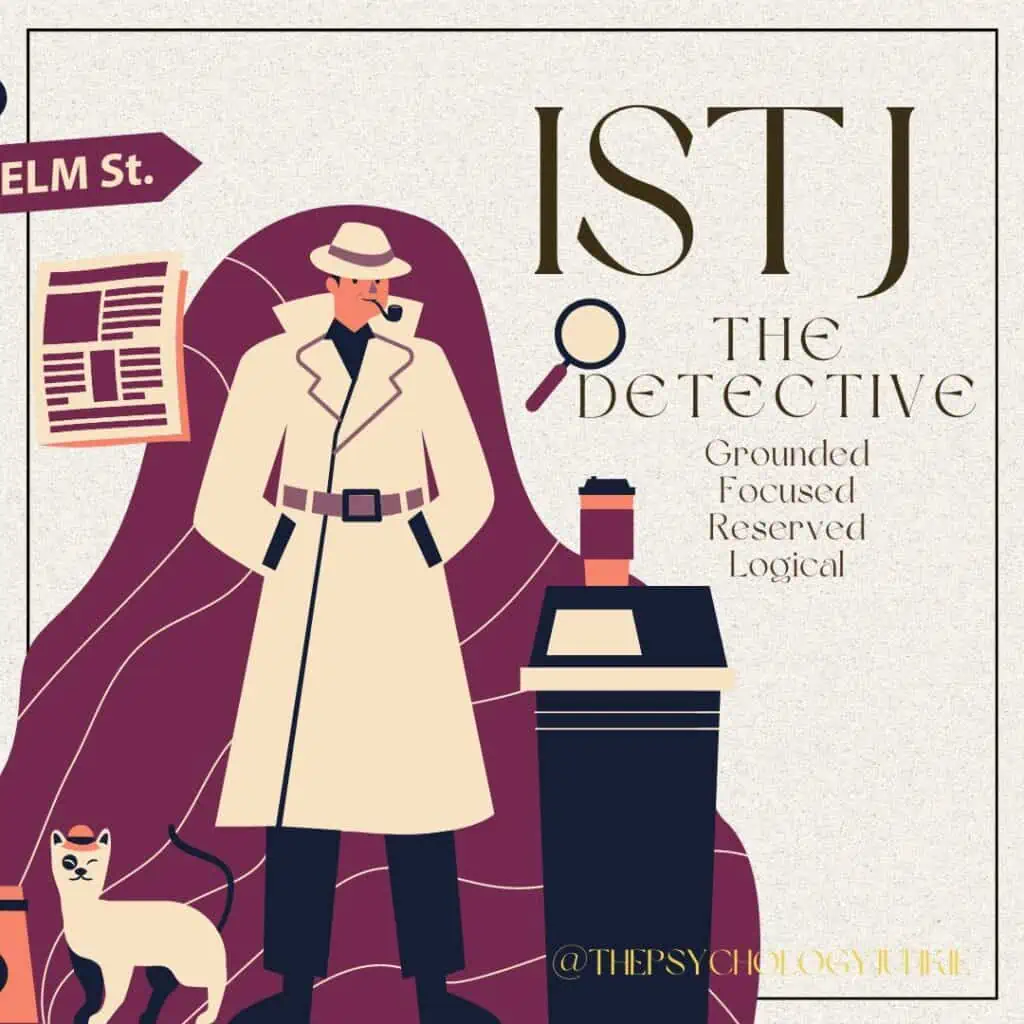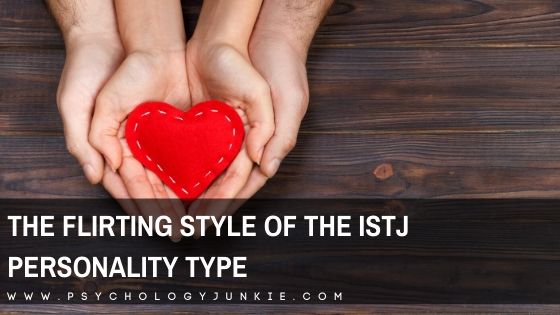ISTJ In-Depth Profile
The ISTJ personality type, called ‘The Detective’, is someone who values reliability, quiet strength, and conviction. Famous for their unwavering resolve and sharp attention to detail, they are often a source of strength during chaotic times. They believe in creating a life that is stable, meaningful, and consistent. Though they may not be the most talkative, they are observant, gathering countless facts from their surroundings and storing them with remarkable precision. This ability stems from their dominant cognitive function: Introverted Sensing (Si). Si gives them a vivid memory for the subtle details that many other types overlook.
While an Intuitive type might see the broader landscape, the ISTJ notices every leaf, every tree, every crevice, crinkle, or nuance that others might overlook. They combine this detail-oriented approach with strong Extraverted Thinking (Te) function, making them quiet yet effective leaders who excel at organizing and delegating tasks to ensure everything gets done efficiently. ISTJs are quick to implement logical solutions to problems, striving to remain objective and fair in their decisions.

At their core, ISTJs are driven by an urge to help their community and family, living honestly and working diligently to achieve their goals. Despite their serious demeanor, ISTJs often surprise others with an offbeat sense of humor that adds a touch of warmth and individuality to their otherwise calm, reserved demeanor.
What Does ISTJ Stand For?
I = Introversion. ISTJs focus inwards before responding to the outside world. They gain energy from alone time when they can reflect on their own thoughts.
S = Sensation. ISTJs prefer taking in information that is tangible, realistic, and concrete. They would usually rather focus on what exists than hypothesize about abstract possibilities.
T = Thinking. ISTJs step outside of a situation in order to see it as objectively and logically as possible.
J = Judgment. ISTJs like having things settled, having decisions made, and having a sense of control or structure to their life. They are typically work-before-play people.
ISTJ Motivations and Vulnerabilities:
Stressors: Lack of alone time, being thrown into unpredictable situations, inconsistent people, multi-tasking, emotionally chaotic people or situations, dealing with people who are unrealistic or impractical.
Driving Force. To live a life of stability, wellness, and comfort. To understand what can be trusted, what’s true, and what will satisfy an inner need for health and safety.
Backup Strength: Ability to draw up plans and map out goals in order to create an orderly, systematic, and productive way of living.
Vulnerability: Can become “stuck in a rut” and overly-cautious about trying new things. May fail to entertain new ideas because they conflict with “tried-and-true” methods.
ISTJ Personality Traits:
Everyone has one-of-a-kind qualities as well as influences from their background that shape their personality. But most average to healthy ISTJs have the following traits:
- Particular
- Responsible
- Consistent
- Detail-oriented
- Quick to spot logical inconsistencies
- Calm
- Grounded
- Conscious of the past and how it impacts the present and future
- Thoughtful
- Reserved
- Purposeful
- Methodical
- Organized
ISTJ Strengths:

- ISTJs are organized. They keep tabs on all their responsibilities and tasks and streamline them so that nothing gets lost in the shuffle. They have a plan for their day and stay consistent with the plan, making sure that nothing important is missed and they’re not caught off guard.
- ISTJs have consistent values. They have a clear sense of right and wrong and what they believe in and are deeply loyal to these personal values. While other types might bend and manipulate their values for the sake of what they want in the moment, ISTJs tend to be strict with themselves, holding themselves to a high standard.
- ISTJs have a keen eye for detail. For the ISTJ the devil is truly in the details. They pay attention to the minutest changes, making sure that if there’s a job to do, it’s done well. In a situation where there might be a problem, they gather all the data, looking closely and examining every nuance to find out how to troubleshoot effectively.
- ISTJs are skilled at logistics and planning. Charting out the plan in order to achieve a goal is something ISTJs excel at. Managing resources, getting people where they need to be on time, and managing logistics comes naturally to them. When life feels chaotic or in disarray, ISTJs feel restless and stressed. They won’t rest till they’ve made sense of everything, organized it, and created a plan (and probably several contingency plans as well).
ISTJ Weaknesses:

ISTJs can be insensitive. Because ISTJs focus on facts and logic, they tend to be less conscious of people’s emotional sensitivities. At times this means that they’ll inadvertently blurt out something true, but with less tact and sensitivity than is needed for the situation. Most ISTJs work on this throughout their lives and become better at delivering truth with tact in mid-life and beyond, but it is a learned skill and not something that comes naturally most of the time.
ISTJs can be stubborn. Because they like what they know and what they trust through personal experience, they can be skeptical of innovation or alternate ideas. They tend to trust the tried-and-true and feel wary of the novel. At times, this can mean they dig in their heels when a little openness would go a long way.
ISTJs may struggle with change. Consistency and routine are deeply important to ISTJs. They try to build a foundation of steadiness and tranquility in life; solid values, a comfortable home, and a clear routine and agenda. When change comes their way, they can feel overwhelmed and stressed by it. They need more time than many other personality types to adjust to change or unexpected events.
ISTJs may take on too much responsibility. Because ISTJs naturally see what needs to be done (and struggle to ask for help in many situations), they can wind up overworking themselves. They’re very exacting in their methods and very particular in how they like a job accomplished, and may take on everything themselves rather than risk delegating to an incompetent person. This can mean that over time their schedules are packed, they are exhausted, and they have little time for the alone time they so desperately need as introverts.
ISTJ Cognitive Functions:

Dominant Function: Introverted Sensing (Si)
Introverted Sensing focuses on memories, details, routines, and inner body sensations. This function guides ISTJ personality to view the world through the lens of their past experiences, giving them an extraordinary capacity to recall facts and details with precision. By drawing upon their own life experiences (and those of others), ISTJs can avoid “reinventing the wheel” and offer practical, time-tested advice in situations that may seem unsolvable. They place great value on “how-to” knowledge and have a keen ability to monitor their progress in a task, making sure everything follows the correct sequence. This function also creates a deep appreciation for traditions and routines, providing comfort through the repetition of meaningful experiences. ISTJs naturally compare and contrast the past with the present, noticing changes and patterns, and finding fulfillment in the natural cycles and rhythms of life.
Auxiliary Function: Extraverted Thinking (Te)
Extraverted Thinking applies logic and structure to any problem that needs to be solved. It is focused on solutions, expediency, and pass-fail metrics. This function helps ISTJs to be systematic, clear, and decisive. It also gives them an eye for how to create order out of chaos, ensuring that every task and system runs like a well-oiled machine.
Because Extraverted Thinking is auxiliary for ISTJs, it is the primary way they show care and support for others. This can look like breaking down a large task into manageable pieces, providing practical advice, lending a helping hand to make someone’s life easier, or explaining something with clarity that might have been confusing someone. Their attention to detail and systematic approach often proves invaluable, especially in times of chaos or stress.
Tertiary Function: Introverted Feeling (Fi)
Introverted Feeling (Fi) is the tertiary function for ISTJs. Fi dwells in the world of internal values and beliefs, guiding ISTJs in what they believe in their hearts. Although ISTJs are often seen as reserved and even stoic, the introverted feeling function gives them a strong moral compass and a deep, if private, emotional world. It helps them align their actions with their values, and gives them a desire to be authentic, real, and in line with what they personally believe is right.
Inferior Function: Extraverted Intuition (Ne)
Extraverted Intuition (Ne) is the inferior function for the ISTJ. It helps them see possibilities in their environment and imagine how they could change things and innovate. Because it’s their inferior function, ISTJs might struggle to embrace change or deal with uncertainty. They prefer to work with what’s proven, tried-and-true, and reliable. However, as they mature and develop, they often become more open to new ideas, more adaptable, and more open-minded.
ISTJs as Friends:
ISTJs are the kinds of friends who show up on time, are there when you need them, and speak the truth candidly. They feel deeply responsible to their friends and are often supportive and pragmatic during tough times, helping to steer the ship when their friends need to clear their heads. They’re also the friends who will create special routines, remember important dates, and remind you of your values when life changes and everything feels unpredictable. Down to earth and steady, they are often a source of great strength and wisdom during tough times.
ISTJs want friends who will see them for who they really are and value them. Many people brush off ISTJs as overly serious or “too quiet.” Yet ISTJs have a quirky side as well. They love to laugh, and often see the humor in things that others miss. While they may not be the “class clown” by any means, if you gain their trust and they feel comfortable enough, you’re sure to find a whimsical, quirky side just under the surface.
Something that deeply matters to ISTJs is loyalty. They are extremely loyal and they want the same thing in return from a friend. Be there when you say you will be there, follow through on your word, and mean what you say. ISTJs hate gossips, manipulators, and phony, underhanded people. Anything that hints of inauthenticity will drive them away.
ISTJs in Relationships:

ISTJs take their commitments seriously and are deeply loyal. When they love someone, they show up on time, help out with practical tasks, and try to set aside time for connection and conversation in their schedules. You can count on an ISTJ partner to be consistent, grounded, and straightforward.
ISTJs aren’t typically the types to go for one-night stands, casual flings, or anything that feels half-hearted. That doesn’t mean they’re ready to propose on the first date! But they’re definitely not into superficial connections. What they really want is to know that their partner is genuinely there for them—no ifs, ands, or buts. They need to be able to rely on their partner to keep their promises and follow through. They also value mutual support and appreciate a partner who takes the time to really listen.
ISTJs are often quite intellectual, though they tend to be a bit private. They might not share all their interests and ideas right away, but as trust builds, they enjoy diving into deep conversations on topics ranging from technology and politics to psychology and beyond.
Top Two Love Languages:
- Quality Time
- Acts of Service
Strengths:
- Loyalty
- Dependability
- Good Listening Skills
- Trustworthiness
- Practical Support
Possible Struggles:
May struggle with expressing their feelings openly
May be overly reliant on routine and structure
Tends towards bluntness, which can seem insensitive at times
Often struggles with change and spontaneity
Needs a lot of alone time, which can create clashes with extroverted partners
ISTJ Careers:

ISTJs are hardworking, detail-oriented, and responsible people who pride themselves on doing a task well and on time. They have a natural eye for understanding systems and procedures, and they’re often the ones who keep things running smoothly behind the scenes. Clear and consistent expectations and logical leadership are crucial to their well-being at work. Throwing them in an unpredictable situation every day or being wishy-washy as an employer will only frustrate and overwhelm them.
The ISTJ’s biggest hardship in the workplace is being in a situation that feels chaotic or out of their control. They are happiest when they know what to expect when they show up to work, and they prefer predictable schedules and routines. Competent leadership is crucial; they need their manager to be able to give clear instructions and provide support when needed. Anything vague or ambiguous will cause them more stress than is necessary. Finally, they need a calm and orderly work environment; a place where they can focus on their work without interruption.
Popular Jobs for ISTJs:
- Medical researcher
- Financial manager
- Bank officer
- Accountant
- Auditor
- Efficiency analyst
- Real estate appraiser
- Police officer
- Detective
- School principal
- Flight engineer
- Engineer
- Judge/magistrate















